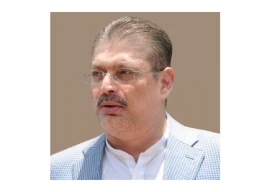
Much of the musings in recent days has surmised that while Pakistan-US ties have plunged into the trust deficit abyss, both sides somewhat reluctantly recognise their mutual dependence in fighting terror. But this may just be wishful thinking.
Washington is suspending its annual military aid to Pakistan by a third, due to concerns about the latter’s dubious cooperation record on the anti-terror front. And to be sure, American grievances are not without substance. Osama bin Laden was infamously found holed up in Pakistan. Soon after, US officials alleged that intelligence-sharing with Pakistan resulted in terrorists at bomb-making factories being tipped off before any strikes were made.
Thus far, the US State Department has made moves to assure Islamabad that civilian assistance will continue, yet how long this will hold is anyone’s guess. Admiral Mike Mullen has said — without elaboration — that the Pakistani government “sanctioned” the murder of journalist Saleem Shahzad. It is unlikely that the top American military officer could issue such on-record comments without a green light from Washington.
Unfortunately, this seems lost on the Pakistani civilian leadership, which appears to be outsourcing responsibility to keep the dollars flowing. The ISI chief was dispatched this week to Washington to meet the interim CIA director. At the same time, General Petreaus, who is set to take over the CIA, was in Pakistan to meet the army chief.
Yet none of this may actually mean much. The US has demonstrated that it does not need Pakistan’s cooperation in taking out high-level al Qaeda operatives based in its territory, as underscored by the Osama bin Laden raid. This will likely prove equally true when it comes to the new al Qaeda chief, Ayman alZawahri, whom the US believes is in North Waziristan. The Pakistan Army has refused to go into that tribal area, opting instead for Kurram Agency. Thus, from the US perspective, if it is doing all the heavy lifting, what need is there to pay Pakistan for a deal not done?
The most significant indication of the American take on the bilateral relationship has come from Leon Panetta, the former CIA director, who is now defence secretary. True, he may have sounded like a broken record when, in Kabul, he yet again declared that the US was in reach of “strategically defeating al Qaeda”. However, this time a new verse was mixed into the long play. The greater threat to the US, he said, hailed from Yemen and going after these targets was one of Washington’s top priorities.
The US first launched a covert drone programme in Yemen in December 2009. US sources credited nearly a decade of intelligence gathering in Pakistan, making the task in Yemen that bit less daunting.
Indeed, it could be said that the Pakistan foray has proved a constructive learning curve in other ways too. Like Pakistan, Yemen has also been accused of diverting US military hardware, as well as a US-trained counterterrorism unit, from the fight against al Qaeda. And like Pakistan, the Yemeni president agreed to CIA drone strikes, while publicly lying to his people about the programme’s existence.
Panetta has also singled out Somalia as a target for taking out al Qaeda. Local militant group, al Shahab, which the US considers a terrorist organisation, has aligned itself with al Qaeda elements in the country. It is also believed to be sheltering the masterminds of the 1998 US embassy bombings in Kenya and Tanzania.
But while it remains to be seen whether Yemen and Somalia will become the new AfPak, one thing is clear. Islamabad has failed to recognise the dwindling currency of its geostrategic importance to the US. It has also spectacularly failed to learn from past lessons; when this happens, the dollars almost immediately dry up.
Published in The Express Tribune, July 16th, 2011.
COMMENTS (10)
Comments are moderated and generally will be posted if they are on-topic and not abusive.
For more information, please see our Comments FAQ



1725612926-0/Tribune-Pic-(8)1725612926-0-165x106.webp)













Whoever edited this article did a bad job !!!
If America is always playing double game then why we always come up to become their partners and deep friends, Just for sake of some money, most of which goes into the pockets of rulers and rest for development of Islamabad, Motorways, Airports, palaces for rulers and import of luxury items...cars, Airconditioners, dinners and lunches, all for rulers and their cronies. We should now tightly close our borders for Jihadis and commb the whole country to get rid of all such illegal entries. We should only worry for our country and country men and should not worry what is happening in India or Afghanistan. Our rulers should adopt a life of simplicity and close most of our Embassies who do nothing but sitting and gossipings with huge staffs. Same should be seen in government offices which are over staffed and have very little to do
It's odd how the biggest trash talkers of the US, preaching it's not their war and that their government should cut ties are the first ones to react with a sense of entitlement to the aid. Also, for the Pakistan citizens information, you're not receiving aid from the evil US because they're using you. It's separate from the war. You would still be receiving it simply based on their humanitarian policies even if all you do is talk trash. It's hard to excuse watching people getting abused when you have the ability to intervene in one way or another.
I agree that the US has lost interest in Pakistan for good reasons after the death of OBL. Once they kill the other high value targets, whether by drones or direct actions, they would not care much what is going on in this part of the world. They would not completely pull out of Af but would not be hands-on. They can keep the terrorists away from the US by keeping a strict control on the US visas. There has not been any major incident in the US for a decade and the control is only going to get better. What these terrorists do in their homeland US does not give a damn. In fact they would be relieved to see them busy in their own field of operation. There is no reason for the US to give any cash or military aid to Pakistan. The only aid that they must supply should come in the form of goods in the field of education, healthcare, infrastructure and job creation. Rich kids usually do not become suicide bombers. In addition, the education of women is most important in Pakistan and Afghanistan. Well to do and educated mothers do not raise suicide bombers and terrorists.
Pity that should any person, such as the author, put it out there in plain language and not take some extreme right-wing Islamo-fascist position, there are immediate accusations of "intellectual servitude" to, I presume, the west.
No wonder they all shout on these so-called "talk shows" you have in Pakistan because we are incapable of respectful discourse.
I wish the writer well and implore the writer to be careful as reporters are not safe inside Pakistan.Please take care.
I fully agree with you that the country lost out due to its rigidity and intransience. It feels sad that the country is willing to sacrifice a financially rewarding partnership with America for the sake of backing obscurantist unreliable proxies that have also killed the most Pakistani citizens. The recent hurried unscheduled trip of Shuja Pasha to the US was a last ditch effort to pull the chestnuts out of the fire. In any game of brinkmanship we suddenly realize we overestimated our hand, as we fall off the cliff. Having indulged in a public tirade against the Aid givers the Establishment has put itself into a tight corner. Who will now come to the aid of a country that does not listen to reason, speaks lies and carries out a tirade against you when caught compromising.
AOA. Another of those one sided, apologetic "analyses" with doomsday written all over.
If America plays a double game that becomes a strategy, even a wali karzai ends up earning accolades from the likes of Mr. Ahmad Rasheed for his acumen to play different sides at same time but when it gets to Pakistan, suddenly everyone turns a perfectionist. lamenting Pakistan for every wrong on the face of this earth, let alone AF PAK. Is it really analysis ? Or is playing to master's voice if not abject intellectual servitude.
GHQ/ISI fools only know "strategic depth" nonsense which they cooked up in 1980's.
Both governments of the US and Pakistan are just posturing and nothing will change. Aid will continue to Pakistan as the suspension of aid has not been brought up in Congress. The whole stageplay is to fool us lay people. We lay people know everything of this mockery, yet we stay quiet and of fear and take the bullying.